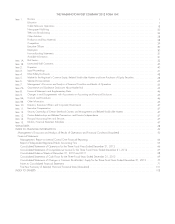Washington Post 2012 Annual Report Download - page 20
Download and view the complete annual report
Please find page 20 of the 2012 Washington Post annual report below. You can navigate through the pages in the report by either clicking on the pages listed below, or by using the keyword search tool below to find specific information within the annual report.legally offering postsecondary distance education in that state. The regulations require an institution to document upon
request by the DOE that it has the applicable state approval. In June 2012, the U.S. Court of Appeals for the District of
Columbia vacated the regulations with respect to distance education. The Court affirmed an order of a Federal District
Court vacating the regulation requiring an institution to meet state requirements in a state in which it has distance
education students, but in which it is not physically located or otherwise subject to state jurisdiction. The ruling is currently
on appeal. The DOE issued a “Dear Colleague Letter,” acknowledging the court’s decision and stating that the DOE
would not enforce the requirements of the regulation and commenting that institutions continue to be responsible for
complying with all state laws as they relate to distance education. Regardless, Kaplan University is authorized to offer
online instruction or is exempt from authorization in 42 states plus the District of Columbia. If the Court of Appeals ruling is
overturned on appeal, if the rules are otherwise reinstated or if the DOE issues new state authorization rules governing
distance education, Kaplan may need to seek additional or revised state authorizations in the future. If Kaplan is unable
to obtain the required approvals for distance-education programs, then Kaplan students residing in the state for which
approval was not obtained may be unable to receive Title IV funds, which could have a material adverse effect on
Kaplan’s business and operations.
Kaplan’s schools are subject to reviews and enforcement activities by state agencies. On September 9, 2011, the Texas
Workforce Commission (TWC) rescinded a prior notice that ten programs at nine KHE Texas campuses had been placed
on “conditional approval” status because of below standard placement rates in 2010. On January 23, 2012, new
regulations became effective allowing the TWC to impose penalties on programs that fail to meet defined placement
thresholds, including, but not limited to, limiting the use of funds from Texas Workforce Development Boards after two
consecutive years of noncompliance and revoking program approvals after three consecutive years of noncompliance.
Congressional Reauthorization of Title IV Programs. All of the Title IV financial aid programs are subject to periodic
legislative review and reauthorization. In addition, while Congress historically has not limited the amount of funding
available for the various Title IV student loan programs, the availability of funding for the Title IV programs that provide for
the payment of grants is primarily contingent upon the outcome of the annual U.S. Federal appropriations process.
Congress also can make changes in the laws affecting Title IV programs in those annual appropriations bills and in other
laws it enacts between Higher Education Act reauthorizations. In 2008, the Higher Education Act was reauthorized
through September 2014. It is anticipated that the next reauthorization of the Higher Education Act by Congress may
commence during the year 2013, but it is not known when Congress will make changes to that statute or to other laws
affecting U.S. Federal student aid.
Whether as a result of changes in the laws and regulations governing Title IV programs, a reduction in Title IV program
funding levels or a failure of schools within KHE to maintain eligibility to participate in Title IV programs, a material
reduction in the amount of Title IV financial assistance available to the students attending those schools could have a
material adverse effect on Kaplan’s business and operations. In addition, any development that has the effect of making
the terms on which Title IV financial assistance is made available materially less attractive could also have a material
adverse effect on Kaplan’s business and operations.
U.S. Senate Committee Review. In the summer of 2010, the Chairman of the Health, Education, Labor and Pension
Committee (the HELP Committee) of the U.S. Senate commenced an industry-wide review of for-profit higher education
institutions. The institutions owned and operated by KHE were included in the scope of this industry-wide review. In July
2012, the Chairman of the HELP Committee issued a final report to conclude the review. The final report included
observations and recommendations for federal policy, but did not include or endorse any specific proposed legislation or
regulations. The ultimate outcome of the review and any implications to the operation of KHE’s institutions are presently
unknown.
Other committees of Congress have also held hearings into, among other things, the standards and procedures of
accrediting agencies, credit hours and program length and the portion of U.S. Federal student financial aid going to for-
profit institutions, and enrollment of active-duty military personnel and veterans. A number of legislators have variously
requested the U.S. Government Accountability Office to review and make recommendations regarding, among other
things, student recruitment practices; educational quality; student outcomes; the sufficiency of integrity safeguards against
waste, fraud and abuse in Title IV programs; and the percentage of proprietary institutions’ revenue coming from Title IV
and other U.S. Federal funding sources. This increased activity may result in legislation, further rulemaking affecting
participation in Title IV programs and other governmental actions. In addition, concerns generated by congressional or
other activity or media reports may adversely affect enrollment in for-profit educational institutions.
Program Reviews, Audits and Investigations. Kaplan’s schools are subject to audits or program compliance reviews
by various external agencies, including the DOE, its Office of the Inspector General and state and accrediting agencies.
While program reviews may be undertaken for a variety of reasons, they are performed routinely as part of regulatory
8THE WASHINGTON POST COMPANY
























